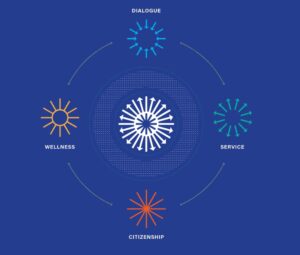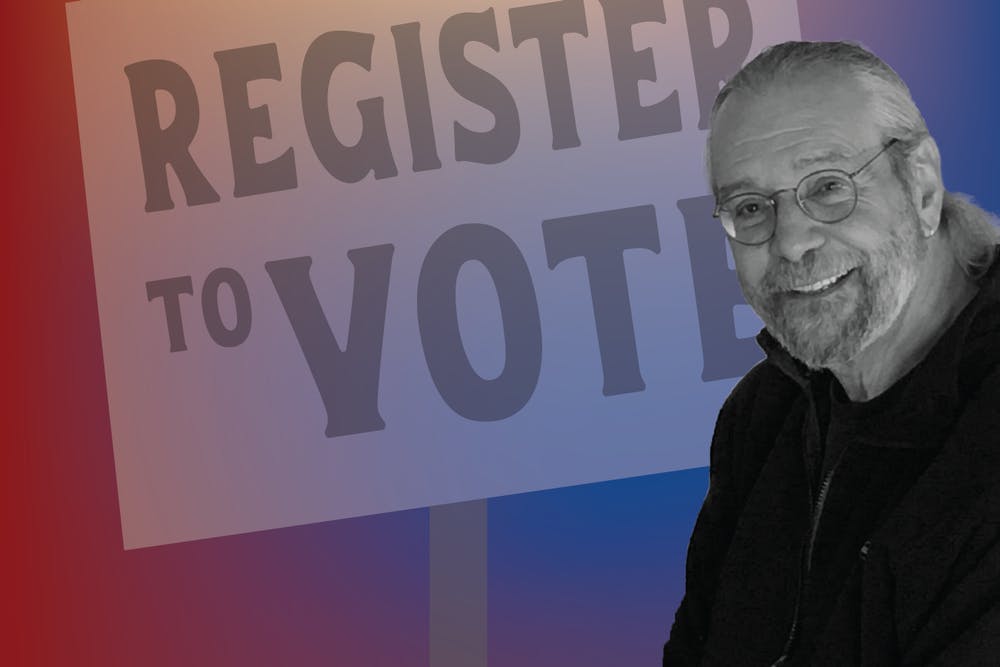As a first–generation, low–income student whose parents immigrated from Italy, Professor Michael Delli Carpini found his way to Penn through a University summer course in geology. Although the class itself sparked no interest in him, the diverse array of people and ideas that definitely did, and eventually led him to study and teach political science.
During his time as a student at Penn, Delli Carpini majored in political science and English literature. It was the early 1970s, and college campuses overflowed with political fervor at the height of anti–Vietnam War protests. Fascinated by the mechanisms behind such student engagement, he began to ask the question that would later guide much of his research: What is it that makes people active or not active in politics? What are the factors that make people informed, engaged citizens?
The professor focuses on studying generational politics in the US—comparing and contrasting how different generations think about politics. He is excited and optimistic about the current waves of activism among young people, which he describes as a combination between traditional (voting in elections) and indirect ways of influencing politics (like volunteering or boycotting). To students still unconvinced of the importance of politics, he presents this challenge: “Keep a journal of what you do in a given day or given week and then backfill how politics has influenced in one way or another.”
His point? From attending university classes to stopping at streetlights to breathing in polluted Philly air, every moment of a person’s life is colored by politics. Like it or not, politics matter. And in the face of the current crises plaguing our democracy, politically engaged citizens matter more than ever.
Though he has lived through many of the ups and downs of American politics—contentious elections, presidents both effective and ineffective, movements addressing race and gender and the environment—Delli Carpini admits that he has “never seen anything as unusual and troubling in terms of our democratic institutions as this moment that we’re in right now.” He continues: “It’s a combination of incredibly wicked problems and political leaders and political systems that don’t seem capable of even beginning to address those problems, in part because we don’t know how to talk across differences.”
The Oscar H. Gandy Professor of Communication and Democracy at the Annenberg School for Communication has recently been honored with the role of Faculty Director for Penn’s new SNF Paideia program, which seeks to address this exact problem: How do we engage with ‘the other side’?
The idea for SNF Paideia emerged from a conversation between Penn President Amy Gutmann and Andreas Dracopoulos, Co–President of the Stavros Niarchos Foundation. Lamenting upon the divisive, distrustful, and deeply personal nature of current public discourse, they created the program, which offers all Penn undergraduates an array of courses, fellowships, and events focused around civic engagement, community service, and wellness.

The holistic wellness element is especially important to the professor. “You don’t want to be a citizen for two hours, a person for eight hours, a worker for eight hours—what you want to do is integrate those things together,” he explains. “So you can live a happy, fulfilling life.”
The SNF Paideia faculty director would be the first to admit that dialogue across ideological differences can be its own teeth–clenching, migraine–inducing nightmare. He has countless stories from his own experiences dealing with political opposites.
For instance, most Wednesday nights prior to the pandemic, Delli Carpini met up with a group of friends to play poker. These friends, none of them academics, came from all walks of life and positions on the political spectrum. Their frequent clashes were tempered by mutual respect, born out of their casual poker games and similar interests in sports, fishing, and movies. “We can try to convince the other person of our point of view, make light of the fact that we disagree,” he explains. “Because we have a relationship that’s based on other things, where we disagree is not as much of a problem.” To Delli Carpini, empathy and respect are essential to successfully reaching out across the aisle.
“You can disagree on policy issues, but you can understand cultural differences. The idea is not to say, ‘My culture is better than your culture.’ It’s, ‘Here’s what my culture is. What’s your culture like? And where do they overlap, where do they have commonalities, and where are they different and why are they different?’”
Reflecting upon decades of research and personal experiences with conducting political discourse, Delli Carpini concludes his story hopeful that more conscientious, robust civic dialogue is possible because “at heart, people can get along with each other.”
After all, most of the time “if you model respectful engagement, it comes back at you.”
If you’re interested in participating in SNF Paideia…
Website: https://snfpaideia.upenn.edu/

